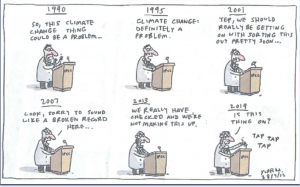Climate change is by far one of the most pressing issues of the 21st century. Humans are creating this change in the climate; therefore humanity must take responsibility for previous actions. Developed and developing nations must switch to an energy efficient and renewable world, but it is a global effort. Climate change is expected to put pressure on natural environments as well as those constructed by humans. Therefore, in order to minimize these challenges, it is imperative to put adaptation plans into action. While the world continues to grow and develop, it is important further development is done in a sustainable manner. Sustainable development is a considerable solution towards developing in a way that lessens environmental degradation. Sustainable development is defined by the World Commission on Environment and Development as, “a mechanism for growth without compromising the ability of future generations to meet their needs” (Warner, 2014). Sustainable development can be achieved through climate resilient pathways, which combine methods of adaptation and mitigation. However, it is argued if climate change will pose significant threats to prospects for sustainable development.
According to the UNFCCC, “Climate change poses a moderate threat to current sustainable development and a severe threat to future sustainable development.” Climate change involves a complex interaction between social and ecological systems; therefore new approaches to sustainable development must take this into consideration. Adaptation and mitigation are both essential for minimizing the risks attributed with climate change. Currently and previously, actions on sustainable development have been delayed, which poses a threat for future sustainable development because it can reduce the options for climate resilient pathways.
On the other hand, researchers at MIT, “looked at three policies achieving the same reductions in the United States, and found that the savings on health care spending and other costs related to illness can be big” (Resutek, 2014). Policies that aim at reducing carbon emissions are beneficial to health problems because these policies lead to reductions in harmful pollutants. These emission reductions also in turn have huge cost reductions for healthcare. One of the researchers Tammy Thompson states, “If cost-benefit analyses of climate policies don’t include the significant health benefits from healthier air, they dramatically underestimate the benefits of these policies” (Resutek, 2014). These results show that climate policies not only benefit the environment, but also benefit health and the economy. The recent advances in technology for renewable energy can achieve more than just meeting the goals of emissions reductions.
While the future in respect to climate change looks entirely too bleak, humanity must use existing technology and implement policy towards continuous sustainable development. We cannot move forward without doing so in a sustainable manner. All nations must work together and assist the most vulnerable nations in taking drastic measures in order to remain under the two-degree limit. Sustainable development produces global benefits in combating climate change.
Works Cited
Resutek, Audrey. “Study: Cutting Emissions Pays for Itself.” MIT News. MIT, 24 Aug. 2014. Web. 02 Nov. 2014.
Warner, Koko, Dr. “Climate Resilient Pathways to Sustainable Development.” Multiple Resilience Pathways: (n.d.): n. pag. UNFCCC. UNFCCC, 19 May 2014. Web.

